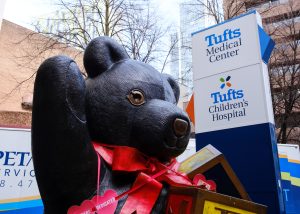Dateline: Downtown
April 13, 2008
There weren’t always bad times. Sometimes, there was turkey. But even when Adrenele Awotona was giving out food to families in need, he couldn’t catch a break:
“CPCS DEAN ADENRELE AWOTONA DONATES TURKEYS TO FAMILIES IN NEED. Last Wednesday afternoon, in a last-minute effort to help families prepare for the holiday, CPCS’ embattled Dean generously purchased turkeys from Shaw’s Supermarkets to be distributed by CPCS staff to households in need around the greater Boston area.”
So reported the Mass Media in November ’06. “Embattled”. That is the word. It showed up again in news delivered by Ben Whelan last Tuesday that Awotona was resigning. CPCS’s problems don’t begin and end with Awotona, and his departure last Tuesday won’t do anything to help the school. It is a bacterial cleansing that in itself does not treat the damage incurred.
You know the story: Awotona, hired by former Provost Paul Fonteyn, proved unpopular from the start. There were rumors spread that he’d been fired from his last job for the kind of unilateral, non-inclusive, borderline antisocial behavior CPCS students and faculty accused him of. Lots of rumors, and some grievances backed up by evidence. (Though as in all things, context is key.) A 2006 rally leaflet ticks off ten troubles CPCS was experiencing: class cancellations, the famous faculty shuffle that resulted in professors teaching classes well outside their areas of expertise, union matters. One particular bone of contention came from what has been called a “gutting” of the school’s writing and computer tutoring programs. Every semester there’d be a new roar rising amid the din of war when another dozen classes would be cancelled, some fully enrolled.
Alison J. Robles is President of the Student Resource Center at CPCS. She matriculated in Fall ’05, a few months after Awotona’s hire, months before the Spring ’06 semester when the situation exploded. She’s glad to put the controversy behind her.
“When I came in, we went to class, everything was normal, more or less. Then, in the spring, people were moved around and things changed. That fall, classes got cancelled. Concentrations and majors were obliterated, teaching contracts weren’t renewed.” She continued to air a long list of grievances and distractions. Finally, she breathed in and settled, her big brown eyes regarding me levelly.
“We’re students. We don’t want anything political. We just wanted to know why our needs weren’t being met.”
I don’t know what to believe. I get yelled at for saying this all the time, but there are two, three, four sides to each story. I refuse to believe that Adenrele Awotona is Mephistopheles. He strikes me as someone could do a magnificent job in his ideal situation, which CPCS for this reason or that was not. Here is an updated list of grievances from an appeal delivered to Awotona for his resignation from tenured faculty at CPCS, accusing him of: “Systematic dismantling, without rationale or consultation, of the governance process and the administrative structure of the College”…fomenting “chaos and confusion in class registrations, class cancellations, and enrollments”… “assumption of all academic decision making powers…”
“Some of our concerns are shared University-wide, but some are specific to CPCS,” Robles told me. “Take the Writing Proficiency Exam, people need it to graduate. Well, how do they do that if they can’t get the programs they need? They just cut our program, no reason given. Awotona called a meeting. He said, ‘We never promised you a diploma, we promised to give you the tools you need.’ After people had already spent months planning their grad careers.”
One contrast was presented to the Mass Media on May Day, 2006. Called “An alternative analysis of the current ‘crisis’ at CPCS”, it is a fascinating document I remember printing with relish in these very pages. I’m a sucker for a plot twist, and this was one. Signed by, among others, Professors Auerbach and Crossley of CLA, the Chair of the African Studies Department Robert Johnson, and several CPCS Professors, it refutes several of the claims against Awotona and calls the campaign against Awotona “enormous and vindictive”, saying, “within the wider UMB community, CPCS is known for these campaigns.” Could it be that the students were pawns in a chess game being played between Awotona and a relatively small group of CPCS faculty, as the letter suggests?
I do know that Awotona is smart. One theory holds that he was hired as an ideological henchman by Provost Fonteyn to purge the school of leftist elements. Whatever the conspiracy theory is, the bottom line is that dozens of CPCS graduates over the last few years, in Labor Studies, in Conflict Resolution, in Gerontology, earned their diplomas amid what has been billed as their school’s existential crisis. And that’s not fair. If it’s Awotona responsible, for shame. If it’s a cadre of CPCS hotheads, ditto. One student told me he was tired of CPCS’s situation, tired of fighting their battles for them, didn’t want to fight no more. So he left. Fending off a concentrated takeover effort is one thing, pitching a turf war is another. Students should be provided stability; ideological wrangles can be fought out at faculty meetings. Whatever the story is, I’m sure fault does not lie solely on one man.
There are anecdotes, to be sure, including a step-over-the-line moment when a (white) Professor supposedly accused Mr. Awotona, who is black, of “racism”. Awotona, for his part, charged that there was a racist conspiracy to take him down, which Professor Cuf Ferguson refuted. I’m sure there were more hallway confrontations than one can pleasantly remember.
Awotona, for his part, seemed antagonistic from the start. His first semester in office was my first semester at school: ever since, I’ve been hearing about him. I look at his credentials and wonder what about the man is so bad. At least the wrapping is nice. Cambridge PhD, certificates from Harvard and Cornell. No joke. His CPCS profile calls him “a transformational leader who places considerable emphasis on team building, creating a supportive environment, facilitating and energizing faculty and student development, and motivating faculty, staff, and students.” Transformational! Indeed.
The real story, of course, is Fonteyn’s departure. Awotona will get more attention, but he wouldn’t have been in office as long as he was without Fonteyn’s backing. Fonteyn by now is comfortably settled in Vermont, where he was named President of cozy Green Mountain College in Poultney, a real one-moose town.
Where will CPCS end up? Who knows. The story doesn’t end with this resignation. The question now, to me, is this: now that they have gotten what they want, will CPCS continue to demand autonomy from the rest of the University? I’m certain some of the old issues, such as class content, hiring procedures, and the all-important funding concerns will remain. The May Day letter claims, “the so-called participatory democracy at CPCS actually entails a core group of senior faculty and retirees (‘founders’) who wield tremendous power over matters such as hiring, promotion, budget and raises.” These senior faculty and “founders”, I presume, are still around. My feeling is that Adenrele Awotona crossed them and paid for it. But now it’s over. So what happens now?
Robles remembers, “Instead of doing club stuff, just being students, we’ve had to help out with registration, do all this administrative work that should be none of our business. The big thing is, students shouldn’t feel like they can’t speak out about things without retribution. From any front. Where there’s this fear, OK, if I say the wrong thing to the wrong person, will it come back to haunt me? Feeling like we have to choose sides, like you can’t be angry as a student for things that are happening, that you can’t speak up for yourself.”










































































